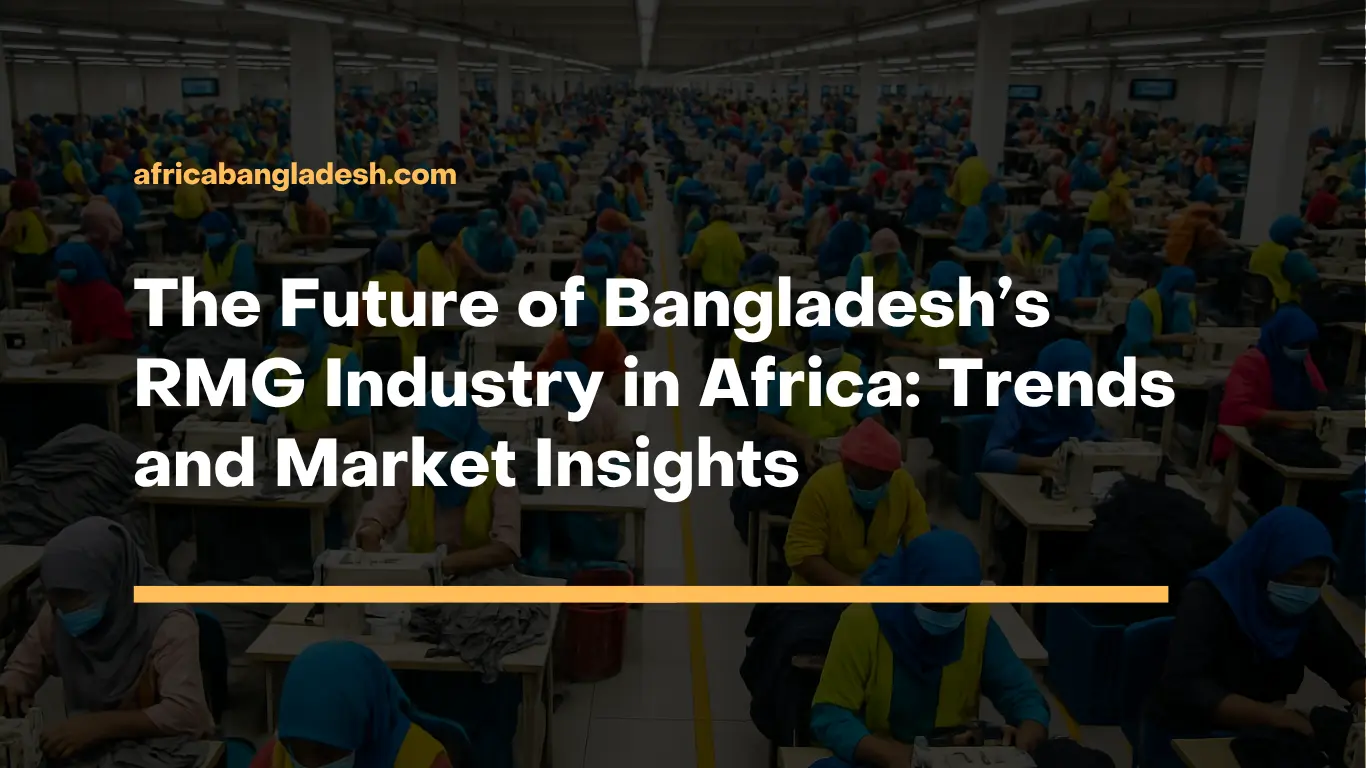
The Future of Bangladesh’s RMG Industry in Africa: Trends and Market Insights
The global apparel market is undergoing a significant shift. International brands are no longer relying solely on traditional sourcing hubs. They are now turning their attention to new regional production centers, creating fresh opportunities for emerging markets. Africa, with its vast untapped potential, is quickly becoming a prime destination for Bangladesh’s Ready-Made Garment (RMG) industry. As Bangladesh continues to lead the global apparel trade, its future in Africa appears bright, driven by the region’s growing demand for affordable fashion and sustainable practices.
In this article, we explore key trends, market insights, and the immense future potential of Bangladesh’s RMG industry in Africa. We will also examine how the Africa Bangladesh Business Forum (ABBF) is positioning itself to support this burgeoning trade partnership.
Current State of Play: Bangladesh’s RMG Sector and the African Market
Bangladesh’s Position
Bangladesh has long been a global leader in the RMG industry, known for its competitive pricing and large-scale manufacturing capabilities. However, the country faces challenges ahead, particularly with the LDC graduation in 2026. This transition will result in the loss of preferential trade access in key markets, potentially impacting Bangladesh’s export advantages.
Growing Bilateral Trade
Despite these challenges, Bangladesh’s export to Africa has been steadily increasing. In 2023, Bangladesh’s exports to Africa reached USD 800 million, showing a strong upward trajectory. This growing trade relationship is reflective of a strategic shift, with more businesses looking to Africa for growth opportunities.
Key African Markets
Countries like South Africa, Nigeria, Kenya, and Egypt have become key players in importing Bangladeshi garments. These markets are seeing an increasing demand for affordable fashion, especially products like knitwear, t-shirts, and denim.
Key Trends Shaping the Future of the Africa-Bangladesh Apparel Trade
Shift to Regional Sourcing
As global supply chains evolve, nearshoring has become a significant trend in international trade. Many brands are moving their sourcing operations closer to the markets they serve, creating an opportunity for Africa to emerge as a major manufacturing hub. Bangladesh’s presence in Africa is crucial for filling this gap and becoming a key partner in Africa’s growing apparel industry.
Rising Consumer Demand in Africa
Africa’s custom apparel market is expected to grow from USD 98.34 million in 2024 to USD 162.06 million by 2032, with a CAGR of 6.44%. This growth is being driven by a rising middle class, rapid urbanization, and a young, fashion-conscious population. These trends align perfectly with Bangladesh’s strengths in producing affordable, high-quality garments for a wide range of consumers.
Focus on Sustainability and Ethical Sourcing
As Gen Z and other modern consumers increasingly prioritize sustainability, there is a growing demand for ethically sourced and sustainable fashion. Africa is beginning to scale up these practices, with some nations like Burkina Faso taking the lead in sustainable sourcing. Bangladesh, known for its expertise in organic cotton production and sustainable manufacturing practices, can play a crucial role in meeting this demand.
Technological Advancement and Digitalization
The adoption of digital technologies such as 3D knitting, CAD systems, and e-commerce platforms is transforming the apparel market in Africa. In parallel, Bangladesh is seeing greater automation in its large and medium-sized factories, which boosts productivity and efficiency. These technological advancements create new synergies between the two regions, making trade more efficient and adaptable.
Market Insights and Future Opportunities
Product Diversification
Bangladesh has traditionally focused on a narrow range of products, such as knitwear, t-shirts, and denim. However, to remain competitive, it must explore new apparel segments and product diversification. Expanding its product portfolio to include fashion-forward items, along with sustainable options, will ensure Bangladesh continues to thrive in the African market.
Investment and Joint Ventures
Bangladesh is already establishing a presence in Africa, with some investors setting up factories in Ethiopia and Kenya. These ventures allow businesses to leverage benefits under the African Growth and Opportunity Act (AGOA), which provides duty-free access to the US market for eligible African nations. The potential for joint ventures in Africa is immense, and these partnerships could lead to long-term, sustainable business relationships.
Infrastructure and Policy Support
The Bangladesh government is actively encouraging exports to non-traditional markets like Africa. The Export Policy 2021-2024 includes various incentives such as cash rewards, tax breaks, and duty-free imports of raw materials. Additionally, initiatives like the African Investment Initiative aim to boost Bangladesh’s presence in Africa by supporting Bangladeshi investments across the continent.
Your Strategic Partner for Success in the African Market
Navigating the Complexities
While the opportunities in Africa are vast, the challenges of entering a new market cannot be overlooked. Issues such as logistics, finding reliable partners, and navigating local regulations require careful planning and market knowledge.
Introducing ABBF
The Africa Bangladesh Business Forum (ABBF) is the premier platform dedicated to facilitating trade and investment between Bangladesh and Africa. ABBF helps businesses bridge the gap by providing vital market intelligence, B2B matchmaking, and policy advocacy.
How ABBF Can Help
- Market Intelligence: ABBF offers in-depth insights into African market trends, helping businesses identify the best opportunities in various countries.
- B2B Matchmaking: ABBF connects Bangladeshi exporters with verified African buyers and partners, ensuring a smooth trade process.
- Policy Advocacy and Support: ABBF works to advocate for favorable policies, providing businesses with the support needed to navigate Africa’s diverse regulatory environments.
- Fostering Partnerships: By fostering joint ventures and long-term business relationships, ABBF is shaping the future of the Africa-Bangladesh apparel trade.
Call to Action
Join the Africa Bangladesh Business Forum (ABBF) today to start your export journey to Africa. With access to trade fairs, business forums, and a network of reliable partners, you will be well-equipped to grow your business and succeed in the African market.
Book a CallFrequently Asked Questions (FAQ)
Q1: What are the fastest-growing apparel markets in Africa?
A: Countries like South Africa, Nigeria, Kenya, and Ghana are experiencing significant growth, thanks to digitalization and the rising demand for custom apparel.
Q2: What government incentives are available for exporting to Africa?
A: The Export Policy 2021-2024 offers various incentives, including cash rewards, tax breaks, and duty-free import of raw materials for exporting to new markets.
Q3: Is sustainable manufacturing important for the African market?
A: Yes, sustainable practices are gaining importance, and aligning with these trends can offer a competitive edge in Africa’s evolving apparel industry.
Q4: What challenges do Bangladeshi exporters face when selling RMG to African markets?
A: Exporters often face issues such as complex logistics, varying local regulations, inconsistent quality standards, and limited market knowledge across different African countries.
Q5: How is Bangladesh preparing for the impact of LDC graduation on its RMG trade?
A: Bangladesh is focusing on product diversification, expanding into new markets like Africa, investing in sustainability, and forming joint ventures to maintain competitiveness after 2026.
Conclusion
The future of Bangladesh’s RMG industry in Africa is full of promise. As Africa continues to grow, with a rising middle class, expanding urbanization, and increasing demand for fashion, Bangladesh’s RMG sector is well-positioned to meet this demand. By diversifying products, adopting sustainable practices, and leveraging strategic partnerships, Bangladesh can unlock the full potential of the African market.
If you’re ready to take the next step and explore these exciting opportunities, connect with the Africa Bangladesh Business Forum (ABBF) today to begin your journey into Africa’s growing apparel industry.

